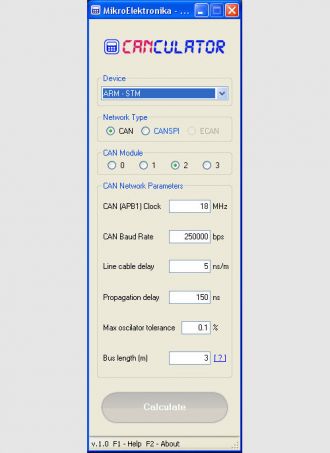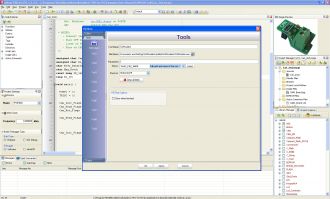
We strongly encourage users to use Package manager for sharing their code on Libstock website, because it boosts your efficiency and leaves the end user with no room for error. [more info]

Rating:
Author: MIKROE
Last Updated: 2016-02-19
Package Version: 1.1.0.0
Category: CAN / LIN / RS485
Downloaded: 18568 times
Followed by: 5 users
License: MIT license
CANculator is a software development tool used for easier CAN baud rate calculation and manipulation of the CAN bus parameters.
Do you want to subscribe in order to receive notifications regarding "CANculator " changes.
Do you want to unsubscribe in order to stop receiving notifications regarding "CANculator " changes.
Do you want to report abuse regarding "CANculator ".
| DOWNLOAD LINK | RELATED COMPILER | CONTAINS |
|---|---|---|
| 1372145497_canculator__other_other.zip [265.48KB] | Other Compiler |
|
Overview
CANculator is a software development tool used for easier CAN baud rate calculation and manipulation of the CAN bus parameters.
This software generates source code compatible with mikroElektronika Compilers (mikroC, mikroPascal and mikroBasic) and for all compiler supported architectures (PIC, dsPIC30, dsPIC33, PIC24, PIC32, AVR and ARM). Using this tool you can start creating CAN based communications much faster and easier.
Features
- CANculator offers an intuitive interface and component based embedded application development.
- Modern and User-Oriented IDE.
- Support for the following microcontroller architectures: PIC, dsPIC30, dsPIC33, PIC24, AVR, ARM - STM, ARM - Stellaris.
- Support for MikroElektronika CANSPI communication board (http://www.mikroe.com/eng/products/view/129/canspi-board).
- Suport for MikroElektronika CAN SPI Click 5V board (http://www.mikroe.com/eng/products/view/814/can-spi-click-5v/).
- CANculator generates source codes for mikroC, mikroBasic and microPascal compilers.
- Autosave on closing.
New Version (1.1.0.0)
- Frequency up to 200MHz.
- Minor bugs fixed.
Notes
- The number of modules depends of the chosen device. For a specific number of CAN modules on a chip consult datasheet for that microcontroller.
- For ARM - STM microcontroller family set appropriate value for APB low-speed prescaler (APB1) in Edit Project dialog. Example: MCU Clock = 72MHz, APB1 = 2, CAN (APB1) Clock = 36MHz. CAN (APB1) Clock = MCU Clock / APB1.
Requirements
- .Net 3.5 framework

Next images demonstrate how can you add this tool to mikroE IDEs.

Use F12 to open Options menu, and then select Tools.
View full image